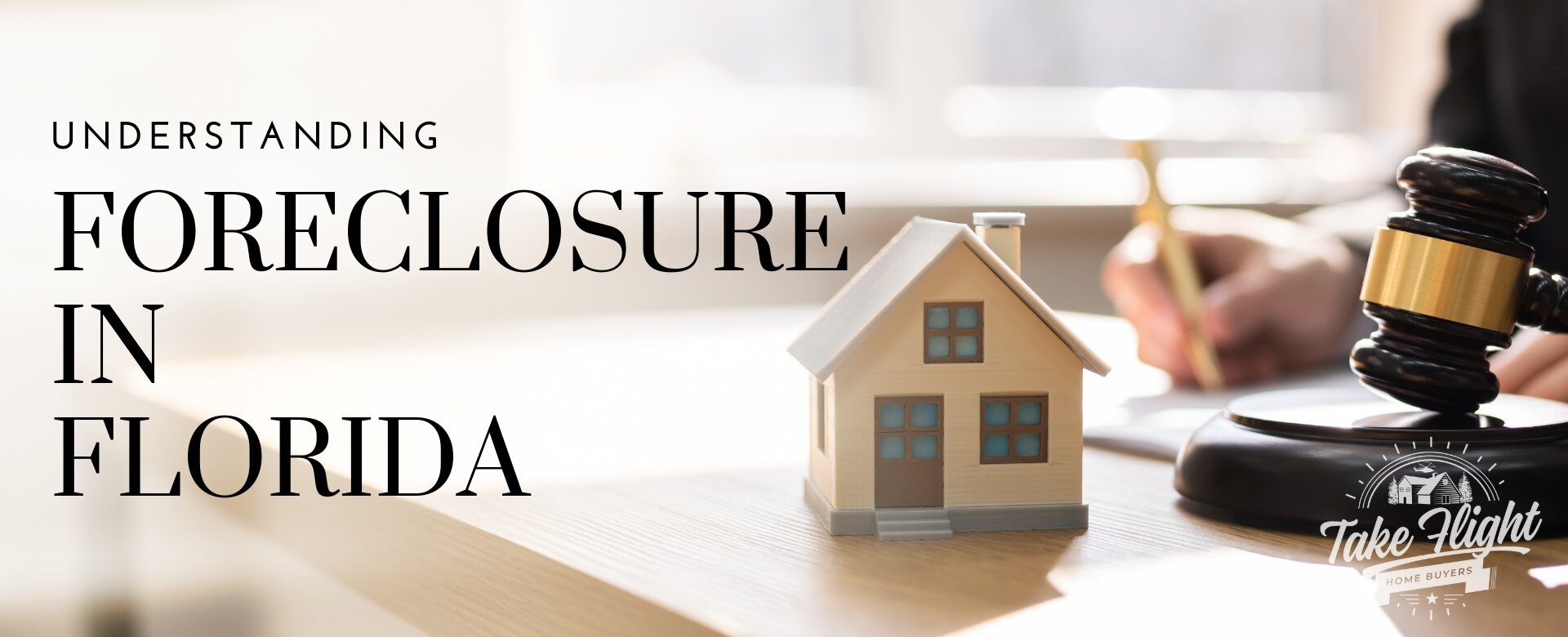
Can I Sell My Home if it’s in Foreclosure in Florida?
Foreclosure is a daunting prospect that no homeowner wants to face. However, it is a reality facing many Americans today, including homeowners here in Pensacola. Whether due to job loss, unexpected financial hardships, or other life challenges, falling behind on mortgage payments can quickly escalate into a foreclosure situation.
In a nationwide study conducted by the U.S. Census Bureau Household Pulse Survey from July 27 to Aug. 8, 2022, nearly 1 million Americans expressed fear about losing their homes. This sentiment resonates deeply in Pensacola, where homeowners strive to maintain their properties and financial stability amidst life’s uncertainties.
Foreclosure occurs when a homeowner is unable to make timely mortgage payments, leading the lender to initiate legal proceedings to repossess the property. The repercussions extend beyond losing the home; foreclosure can also severely impact one’s credit score and financial well-being, making it challenging to secure future loans or housing opportunities.
As a homeowner in Pensacola facing the possibility of foreclosure, understanding your options and taking proactive steps is crucial. On this page, we’ll delve into the intricacies of foreclosure, the different types of foreclosure processes in Florida, and actionable strategies for selling your home before foreclosure becomes inevitable. Whether you’re seeking guidance on navigating the foreclosure process or exploring alternatives to protect your assets, this comprehensive guide is tailored to address your concerns and provide valuable insights into the foreclosure landscape in Pensacola.
Let’s dive into the details and empower you with the knowledge needed to make informed decisions during this challenging time.
Understanding Foreclosure in Florida
Foreclosure is the legal process through which a lender can repossess a property when the homeowner fails to make mortgage payments. It’s a daunting prospect that can result from various circumstances, including:
- Job loss or income reduction
- Divorce or the death of a spouse/partner
- Accruing debt from medical bills or credit cards
- Relocation without selling the home
- Natural disasters impacting financial stability
Receiving a foreclosure notice is a distressing experience, and it’s crucial to understand the steps involved and potential outcomes.
Types of Foreclosure in Pensacola
In Northwest Florida, foreclosure proceedings can take two primary forms: non-judicial foreclosure and judicial foreclosure. Understanding the differences between these processes is crucial for homeowners navigating the complexities of foreclosure.
Non-Judicial Foreclosure: A Swift Process
Non-judicial foreclosure is favored by lenders for its efficiency and speed. It bypasses court involvement and adheres to state-specific procedures outlined in the mortgage or deed of trust. Here’s how it typically unfolds:
- Notice of Default: When a homeowner falls behind on mortgage payments, the lender issues a notice of default, highlighting the overdue amount and the intention to proceed with foreclosure.
- Notice of Sale: Following the notice of default, a notice of sale is issued, announcing the date and time of the foreclosure auction. This notice is typically published in local newspapers and posted on the property.
- Auction: The foreclosure auction takes place on the specified date, with the property sold to the highest bidder. In Florida, auctions are often conducted at the county courthouse or online.
- Post-Sale Period: After the auction, the winning bidder receives ownership of the property, and the homeowner must vacate if still residing on the premises.
Non-judicial foreclosure offers a streamlined process for lenders to reclaim properties without court delays. However, homeowners should be aware of their rights and options during this process, including the potential for deficiency judgments if the sale proceeds don’t cover the outstanding mortgage balance.
Judicial Foreclosure: Court Oversight and Due Process
In contrast, judicial foreclosure involves legal proceedings overseen by the court system. Here’s an overview of how judicial foreclosure unfolds:
- Lawsuit Filing: The lender initiates a lawsuit against the homeowner, citing default on mortgage payments and seeking a court order to foreclose on the property.
- Court Proceedings: The court reviews the case, ensuring that the homeowner receives proper notice and the opportunity to respond to the foreclosure action. This phase may involve hearings and legal arguments from both parties.
- Foreclosure Sale: If the court grants the lender’s request for foreclosure, a foreclosure sale is scheduled. Similar to non-judicial foreclosure, the property is auctioned to the highest bidder.
- Post-Foreclosure Process: After the auction, the winning bidder gains ownership, and the homeowner may be subject to eviction if still occupying the property.
Timeline for Each Process

Non-Judicial Foreclosure Timeline: Typically ranges from 120 days to several months, depending on state laws and the specific circumstances of the case. The auction and post-sale eviction process follow a relatively swift timeline.
Judicial Foreclosure Timeline: Can extend from several months to over a year due to court proceedings and legal requirements. The timeline for foreclosure sales and post-foreclosure actions is governed by court schedules and procedures.
Both non-judicial and judicial foreclosures carry significant implications for homeowners, including potential deficiency judgments, credit impact, and legal obligations. Navigating the foreclosure process requires careful consideration of legal rights, financial implications, and available options. Seeking guidance from legal and financial professionals can help homeowners make informed decisions and mitigate the impact of foreclosure on their financial well-being.
Implications for Homeowners
Both non-judicial and judicial foreclosures carry significant implications for homeowners:
- Deficiency Judgments: If the property sells for less than the outstanding mortgage balance, the lender may pursue a deficiency judgment against the homeowner for the remaining debt.
- Credit Impact: Foreclosure can have a severe impact on credit scores, making it challenging to secure future loans or housing arrangements.
- Legal Obligations: Homeowners must adhere to state laws regarding foreclosure timelines, eviction procedures, and potential liabilities after the property’s sale.
Navigating the foreclosure process requires careful consideration of legal rights, financial implications, and available options. Seeking guidance from legal and financial professionals can help homeowners make informed decisions and mitigate the impact of foreclosure on their financial well-being.
Selling Your Home Before Foreclosure in Florida
Selling your home before foreclosure in Pensacola provides homeowners with crucial alternatives to navigate financial challenges and avoid the severe consequences of foreclosure. Here’s an expanded look at the pathways to consider:
Working with a Real Estate Agent
When homeowners decide to work with a real estate agent to sell their property before foreclosure, they enter into a traditional real estate listing agreement. This process involves several key steps and considerations:
- Agent Selection: Choosing the right real estate agent is crucial. Homeowners should look for agents with experience in handling foreclosure situations or distressed properties. Agents familiar with local market trends and foreclosure procedures can provide valuable guidance throughout the selling process.
- Property Assessment and Pricing: The agent begins by assessing the property’s condition, market value, and comparable sales in the area. Pricing the property competitively is essential to attract potential buyers, especially in a market with foreclosure properties.
- Marketing Strategy: The real estate agent develops a marketing strategy to showcase the property to potential buyers. This may include professional photography, virtual tours, open houses, and listing the property on multiple online platforms, including the Multiple Listing Service (MLS).
- Negotiation and Offers: As offers come in, the agent assists in negotiating with buyers to secure the best possible deal for the homeowner. Negotiations may involve price adjustments, contingencies, and terms of sale.
- Closing Process: Once an offer is accepted, the agent guides the homeowner through the closing process, coordinating with title companies, escrow agents, and other parties involved in the transaction. The closing process includes inspections, appraisals, and finalizing legal documents.
While working with a real estate agent offers the advantage of professional representation and market exposure, it also comes with challenges, especially for homeowners facing foreclosure:
- Commissions and Fees: Real estate agents typically charge a commission, usually between 3% to 6% of the final sale price. This commission is deducted from the sale proceeds, reducing the amount homeowners receive.
- Time Constraints: The traditional real estate process can take time, from listing the property to finding a buyer and completing the closing process. For homeowners in foreclosure, time is often a critical factor, and delays can exacerbate financial strain.
- Market Conditions: Market conditions, including supply and demand, can impact the time it takes to sell a property. In a market with a high inventory of foreclosed properties, competition can affect the sale price and time on market.
Despite these challenges, working with a real estate agent can offer benefits such as professional guidance, marketing expertise, and access to a broader pool of potential buyers. Homeowners should carefully weigh their options, consider the local market conditions, and consult with real estate professionals to determine the best approach for selling their property before foreclosure.
Short Sale
A short sale is an option for homeowners whose property value is less than the outstanding mortgage balance. This process involves negotiating with the lender to accept a sale price below the mortgage amount, allowing the homeowner to sell the property without fully satisfying the debt. It’s important to understand the key aspects and implications of a short sale:
- Lender Approval: The most critical step in a short sale is obtaining approval from the lender. Homeowners must demonstrate financial hardship and provide documentation to support the need for a short sale, such as income statements, bank statements, tax returns, and a hardship letter explaining the circumstances that led to the inability to continue mortgage payments.
- Credit Impact: While a short sale can prevent foreclosure and provide relief from an unmanageable mortgage, it can have a significant impact on credit scores. The short sale will be reported to credit bureaus and may remain on credit reports for several years, affecting the ability to obtain new credit, loans, or mortgages in the future. However, a short sale’s impact on credit is generally less severe than a foreclosure, making it a preferable option for homeowners concerned about their creditworthiness.
- Debt Forgiveness and Deficiency Judgment: In some cases, lenders may agree to forgive the remaining debt after a short sale. However, it’s crucial to understand that there may still be tax implications for the forgiven debt, as the IRS may consider it as taxable income. Additionally, if the lender does not forgive the deficiency (the difference between the sale price and the outstanding mortgage balance), homeowners may be subject to a deficiency judgment, where the lender can pursue legal action to collect the remaining debt.
- Negotiation and Process: The short sale process involves negotiating with the lender, often through a short sale specialist or real estate agent experienced in handling short sales. The timeline for approval can vary, and homeowners should be prepared for potential delays and extensive documentation requirements. Once approved, the property can be marketed for sale, and offers must be submitted to the lender for acceptance.
Despite the complexities and potential drawbacks, a short sale can provide a viable exit strategy for homeowners facing financial hardship and foreclosure. It allows homeowners to sell the property and avoid the more severe consequences of foreclosure, such as eviction, foreclosure proceedings, and a more significant impact on credit scores. However, homeowners should carefully weigh the pros and cons of a short sale, seek legal and financial advice, and fully understand the implications before proceeding with this option.
Sell Your House AS-IS to a Cash Buyer
Direct cash buyers like Take Flight Home Buyers offer a swift and hassle-free solution for homeowners facing foreclosure. Selling to a cash buyer presents several benefits that can significantly alleviate the stress and financial burden of foreclosure:

- Quick Closing Process: Cash buyers typically expedite the closing process, allowing homeowners to finalize the sale and move forward swiftly.
- No Commissions or Fees: Unlike traditional real estate transactions that involve agent commissions and fees, selling to a cash buyer eliminates these costs, ensuring that homeowners retain more of the sale proceeds.
- Avoidance of Foreclosure Repercussions: Selling to a cash buyer enables homeowners to avoid the adverse effects of foreclosure on credit scores, future loan eligibility, and legal implications.
- Potential to Pay Off Debts and Move Forward Financially: The proceeds from selling to a cash buyer can be used to pay off outstanding debts, including mortgage arrears, allowing homeowners to regain financial stability and start anew.
By exploring these pathways and considering the benefits of selling to a cash buyer, homeowners in Pensacola can make informed decisions to address foreclosure challenges effectively. Seeking guidance from real estate professionals and financial advisors can further enhance the decision-making process, ensuring a smoother transition and better financial outcomes.
Stopping the Foreclosure Process
Stoping foreclosure requires proactive steps and consideration of additional strategies beyond selling the property. Here’s an expanded look at these strategies:
- Paying Off Debts
One strategy to halt foreclosure is to focus on paying off debts. This may involve liquidating assets, such as selling personal belongings or other properties, to generate funds for settling outstanding debts, including mortgage arrears. Additionally, homeowners can explore options for financial assistance, such as borrowing from family or friends, obtaining a personal loan, or seeking support from local nonprofit organizations that offer financial counseling and assistance programs. By prioritizing debt repayment, homeowners can address the immediate financial challenges and prevent foreclosure.
- Bankruptcy Consideration
While considered a last resort, bankruptcy is a legal option that can temporarily halt foreclosure proceedings. Filing for bankruptcy triggers an automatic stay, which temporarily stops creditors, including mortgage lenders, from pursuing collection actions, including foreclosure. However, it’s essential to understand that bankruptcy comes with long-term credit implications and should be carefully considered after consulting with a bankruptcy attorney. Bankruptcy can remain on credit reports for several years, impacting credit scores and future financial decisions. Homeowners should weigh the benefits and drawbacks of bankruptcy and explore alternative solutions before pursuing this option.
- Homeowner Affordability and Stability Plan (HASP)
Eligible homeowners can explore government-backed loan modification programs like the Homeowner Affordability and Stability Plan (HASP) to restructure mortgage payments and avoid foreclosure. HASP, part of the Making Home Affordable program, offers options such as loan modification, refinancing, and forbearance to help homeowners facing financial hardship. These programs aim to make mortgage payments more affordable by adjusting interest rates, extending loan terms, or temporarily reducing monthly payments. Homeowners can apply for HASP through their mortgage servicer and provide documentation of financial hardship, income, and expenses to determine eligibility for the program. By participating in loan modification programs like HASP, homeowners can potentially avoid foreclosure and achieve more manageable mortgage payments.
These additional strategies complement efforts to sell the property or negotiate with lenders, providing homeowners with a range of options to address financial challenges and prevent foreclosure. It’s crucial for homeowners to seek guidance from financial advisors, housing counselors, and legal professionals to explore these strategies effectively and make informed decisions based on their specific financial situation and goals.
Related Articles
5 Ways the Foreclosure of Your Pensacola House Will Impact You in the Future
What Homeowners in Pensacola Can Expect During the Foreclosure Process
The Difference Between Pre-Foreclosure and Foreclosure for Homeowners in Pensacola
How to Sell Your House During Bankruptcy in Pensacola
Stopping the Foreclosure Process: A Guide for Pensacola Homeowners
Need to Sell Your Home Fast in Pensacola?
Navigating foreclosure or pre-foreclosure situations can be overwhelming and stressful for homeowners. It requires making informed decisions and seeking reliable support to address financial challenges effectively. At Take Flight Home Buyers, we understand the complexities of these situations, and we specialize in assisting homeowners facing foreclosure in Pensacola and the surrounding areas. Here’s how we can help:
- Expertise in Foreclosure Situations
Our team at Take Flight Home Buyers has extensive experience in dealing with foreclosure and pre-foreclosure scenarios. We understand the unique challenges homeowners face during these times, including the urgency to sell quickly and the desire to avoid the negative impacts of foreclosure on credit scores and financial stability.
- Cash Offers and Streamlined Process
We offer competitive cash offers for properties in Pensacola, providing homeowners with a swift and hassle-free solution. Our streamlined process eliminates the need for listing the property, dealing with real estate agents, and waiting for potential buyers. Instead, we directly purchase properties for cash, ensuring a quick closing and immediate relief from foreclosure concerns.
- Relief and Fresh Start
Selling your home to us can provide much-needed relief and a fresh start. By avoiding foreclosure proceedings, homeowners can prevent the adverse effects on credit scores, legal implications, and the emotional stress associated with losing a home. Our goal is to help homeowners move forward financially and regain control of their future.
- Professional and Supportive Service
We prioritize professionalism, transparency, and empathy in our interactions with homeowners. Our team is dedicated to providing supportive guidance throughout the selling process, answering any questions or concerns, and ensuring a smooth transaction from start to finish.
If you’re facing foreclosure or pre-foreclosure in Pensacola, don’t hesitate to contact us today. We are committed to providing fair cash offers on properties, offering a lifeline to homeowners in challenging situations. Take the first step towards financial stability and peace of mind by reaching out to us for assistance with selling your Pensacola property the fast and easy way.

What Do You Have to Lose? Get Started Now!
We buy houses in ANY CONDITION in Florida. There are no commissions or fees and no obligation whatsoever. Start below by giving us a bit of information about your property or call (850) 665-0717.
